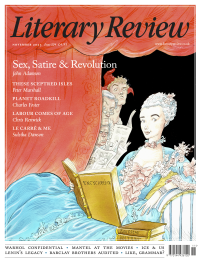Emma Garman
Court Life
Western Lane
By Chetna Maroo
Picador 176pp £14.99
Western Lane, a moving portrait of a British-Gujarati family stunned by grief, is written with a striking minimalism. Chetna Maroo, it seems, wants us to inhabit her characters’ reality through a sort of literary osmosis, without the distractions of a distinctive voice or anchoring details (clues suggest we’re in 1980s Bedfordshire). Her prose is rigorously pared back, as though she’d prefer to dispense with messy language altogether, and so lithe and unobtrusive is it that when I came across the novel’s only clunky sentence, I was startled.
The story itself flows around absences and things left unsaid. We meet Gopi as an eleven-year-old. Her mother has just died and she lives with her two older sisters, Mona and Khush, and their father, known as Pa. Soon after his wife’s funeral, Pa decides that the girls’ hobby, squash, will become a daily routine. ‘We’d been playing squash and badminton twice a week ever since we were old enough to hold a racket,’ explains Gopi, ‘but it was nothing like the regime that came after.’ Before and after school, and on weekends, Pa supervises their training drills at a local sports centre, Western Lane. And so the impossible question of how to cope without Ma is displaced, with little time or energy left for unruly emotions or shared mourning.
In the game’s mental discipline and athletic artistry, Gopi finds ‘a feeling of having been rescued’. Driven on by Pa, who hardly communicates except to direct her training, she becomes a fearsome player. Her sisters lose interest, but for Gopi and Pa, the world narrows to this single

Sign Up to our newsletter
Receive free articles, highlights from the archive, news, details of prizes, and much more.@Lit_Review
Follow Literary Review on Twitter
Twitter Feed
It wasn’t until 1825 that Pepys’s diary became available for the first time. How it was eventually decrypted and published is a story of subterfuge and duplicity.
Kate Loveman tells the tale.
Kate Loveman - Publishing Pepys
Kate Loveman: Publishing Pepys
literaryreview.co.uk
Arthur Christopher Benson was a pillar of the Edwardian establishment. He was supremely well connected. As his newly published diaries reveal, he was also riotously indiscreet.
Piers Brendon compares Benson’s journals to others from the 20th century.
Piers Brendon - Land of Dopes & Tories
Piers Brendon: Land of Dopes & Tories - The Benson Diaries: Selections from the Diary of Arthur Christopher Benson by Eamon Duffy & Ronald Hyam (edd)
literaryreview.co.uk
Of the siblings Gwen and Augustus John, it is Augustus who has commanded most attention from collectors and connoisseurs.
Was he really the finer artist, asks Tanya Harrod, or is it time Gwen emerged from her brother’s shadow?
Tanya Harrod - Cut from the Same Canvas
Tanya Harrod: Cut from the Same Canvas - Artists, Siblings, Visionaries: The Lives and Loves of Gwen and Augustus John by Judith Mackrell
literaryreview.co.uk